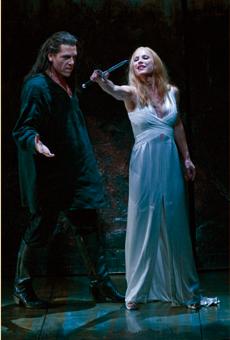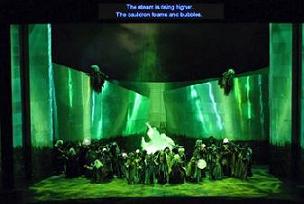Review: Lyric Opera's Shakespearean Season Premiere
By Alexander Hough in Arts & Entertainment on Oct 7, 2010 7:00PM

Photo by Robert Kusel
Verdi had long found inspiration in Shakespeare, and although he wrote Macbeth at the somewhat ripe age of 33, it's remarkable that he chose a work of Shakespeare as his subject at all. Other composers had based operas on Shakespeare - Rossini and Bellini to name two - but their works were loose interpretations; for example, Bellini's "I Capuleti e i Montecchi" was culled from Italian sources rather than Shakespeare's "Romeo and Juliet." In fact, Shakespeare was more or less unknown in Italy at the time, the first staging of a Shakespeare work not taking place until 1842 (it was "Othello," and it flopped).
With this in mind, it's a testament to Verdi himself that "Macbeth" was positively received, although he was somewhat abetted by the success of his previous operas written during his second, and much more triumphant, move to Milan from his small hometown of Busseto. In "Macbeth" we see the characteristics that made Verdi great: dramatic music that carries the on-stage action, to say nothing of his ability to write a good tune. Above all, the core of Shakespeare's "Macbeth" - the play was necessarily altered - is communicated, arguably even improved upon. Verdi's "Macbeth" is, at bottom, a fearless looking into the psychology of evil.
With this in mind, the Lyric's "Macbeth" is successful. That is only partially due to the individual performances, although Thomas Hampson as Macbeth is strong, his acting outshining his voice; Nadja Michael exceptional as Lady Macbeth, both musically and dramatically; and costume designer Virgil Thompson brilliant, choosing to accentuate Michael's two best physical attributes besides her vocal cords, making us all empathize with Macbeth, a victim of his wife's not-so-subtle prodding as much as his own ambition.

Photo by Robert Kusel
Gaines's stated goal was to provide a setting that is timeless. We're skeptical about whether that was achieved; for example, the Macbeths' weapon of choice is still the dagger, and when's the last time you heard about someone getting daggered? Outside of Jamaica, anyhow? But Noone's austere sets of Frank Gehry-like bent metal are wonderful insofar as they lend a cold atmosphere that amplify the Macbeths' psychosis. Particularly effective was the Macbeths' cylindrical room that hosts much of their plotting, the small, claustrophobia-inducing space focusing the isolation of the couple's downward spiral. Another nod should be given to lighting designer Robert Wierzel, who plies the cold sets with equally cold lighting, often in unusual greens and blues.
All these elements come together in the final two acts, when the Lyric's production gets downright creepy. We're not even referring to the witch who, in prophesying Macbeth's demise, cuts a baby out of her own belly. That doesn't hold a candle to later in the scene with the endless march of children from the ground, made even more chilling by the lifeless child-sized dummy that floats at the same time. Which is real and which is a puppet? You begin to question your own sanity.
But even better is the first scene of the final act, which centers on Macduff mourning his family's murder. Stunning vocal performance, the miserable ragtag Scottish refugees soaked in blue light, an anonymous child's death paralleling Macduff's words - the Macbeths leave numerous bodies in their wake as they shore up power, but the awful repercussions of their actions are finally viscerally felt. Hallucinations are frightening, but they're nothing compared to evil's reality.
Remaining performances of "Macbeth" on October 9, 12, 15, 18, 21, 24, and 30, Civic Opera House, 20 N. Wacker Drive, $38-$207